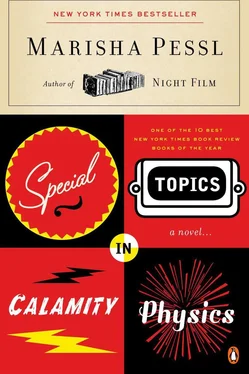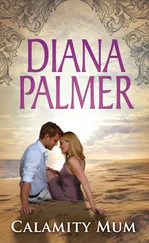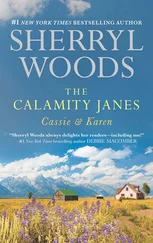I was a Loose End.
“So how are you?” she asked. “How’s life? Your dad?”
“He’s fantastic.”
“And Harvard?”
“Fine.”
“Well, that brings me to the purpose of the call, an apology, which I will not dodge or do unconvincingly,” she said officially, which made me sort of sad, because it sounded nothing at all like the Real Jade. The Jade I knew, as a rule, always dodged apology and, if forced, did it unconvincingly, but this was the Jade Vine ( Strongylodon macrobotrys ), a member of the Leguminosae family, distantly related to the humble garden pea.
“I’m sorry for the way I behaved. I know what happened had nothing to do with you. She just lost it, you know. People do that all the time and they always have their own reasons. Please accept my request for forgiveness.”
I thought about interrupting her with my little cliff-hanger, my about-face, my kick in the teeth, my fine print: “Actually, to be technical about the whole thing, uh…” But I couldn’t do it. Not only did I not have the courage, I didn’t see the point of telling her the truth — not now. Jade was blooming, after all, receiving ideal amounts of sun exposure and water, displaying promising signs of reaching her maximum height of seventy feet, and would eventually expand via seeds, stem-cutting in the summer, layering in the spring, to overtake the entire side of a stone wall. My words would have the effect of a one-hundred-day drought.
The rest of the call was a fervid exchange of “so give me your e-mail,” and “let’s plan big reunions”—paper-doll pleasantness that did little to cover the fact we’d never see each other again and would rarely speak. I was aware as ever that she, and maybe the others too, would occasionally float over to me like pollen off a withered dandelion with news of sugarplum marriages, gooey divorces, moves to Florida, a new job in real estate, but there was nothing keeping them and they’d drift away as simply and randomly as they’d come.
Later that day, as Fate would have it, I had my “Greek and Roman Epic” lecture with Professor of the Humanities, Emeritus, Zolo Kydd. Students called Zolo “Rolo,” because, if only in stature and complexion, he happened to resemble that particular chewable chocolate caramel candy. He was short, tan and round, wore bright plaid Christmas pants regardless of the time of year, and his thick, yellow-white hair encrusted his shiny freckled forehead as if, ages ago, Hidden Valley Ranch salad dressing had been dribbled all over him. Customarily, by the end of Zolo’s lectures on “Gods and Godlessness” or “The Beginning and the End,” most students had nodded off; unlike Dad, Zolo had an anesthetizing delivery style, which had to do with his run-on sentences and tendency to repeat a certain word, usually a preposition or adjective, in a way that brought to mind a small green frog bouncing across lily pads.
And yet, on this particular afternoon, my heart was in my throat. I hung on his every word.
“Came across a — a–a funny little editorial the other day about Homer,” Zolo was saying, frowning down at the lectern and sniffing. (Zolo sniffed when he was nervous, when he’d made the brave decision to leave the safe bank of his lecture notes and drift away on a shaky digression.) “It was in a small journal, I encourage all of you to take a look at it in the library, the — the — the little-known, Classic Epic and Modern America . Winter volume, I believe. It turns out, a year ago, a couple of wacko Greek and Latinists like myself wanted to conduct an experiment on the power of the epic. They arranged to give copies of The Odyssey to — to — to a hundred of the most hardened criminals at a maximum-security prison — Riverbend, I think it was — and would you know it, twenty of the convicts read the thing cover to cover, and three of them sat down and wrote their own epic tales. One is going to be published next year by Oxford University Press. The article discussed epic poetry as a very viable means to reform the — the — the deadliest offenders in the world. It — it appears, funnily enough, there’s something within it that lessens the rage, the — the stress, pain, brings about, even to those who are far, far, gone, a sense of hope —because there’s an absence in this day and age of real heroism. Where are the noble heroes? The great deeds? Where are the gods, the muses, the warriors? Where is ancient Rome? Well, they have to — to — to be somewhere, don’t they, because according to Plutarch, history repeats itself. If only we’d have the nerve to look for it in — in ourselves, it just — it just might—”
I don’t know what came over me.
Maybe it was Zolo’s perspiring face, festively reflecting the overhead fluorescents like a river reflecting carnival light, or the way he gripped the podium as if without it he’d collapse into a pile of brightly colored laundry — direct contrast to Dad’s posture on any stage or raised platform. Dad, as he expounded upon Third World Reform (or whatever he felt like expounding upon; Dad was neither intimidated by, nor nervy around, the Verbal Foray on-the-Fly or the Apropos Excursion), always stood without the slightest slouch or sway. (“While lecturing, I always imagine myself a Doric column on the Parthenon,” he said.)
Without thinking, I stood up, my heart heaving against my ribs. Zolo stopped midsentence and he, as well as the three hundred drowsy students in the lecture hall, stared at me as I, head down, hacked through backpacks, outstretched legs, overcoats, sneakers and textbooks to get to the nearest aisle. I lurched toward the double EXIT doors.
“There goes Achilles,” Zolo quipped into the microphone. There were a few tired laughs.
I ran back to the dorm. I sat down at my desk, laid out a three-inch stack of white paper and hastily began to scrawl this Introduction, which originally started with what happened to Charles, after he’d broken his leg in three places and had been rescued by the National Guard. Supposedly he’d been in such pain he couldn’t stop shouting, “God help me!” over and over again. Charles had a terrifying voice when he was upset, and I couldn’t help but think those words had minds of their own, floating up like helium balloons through the sterile halls of the Burns County Hospital, all the way to the Maternity Ward, so every child entering the world that morning heard his screams.
Of course, “Once upon a time there was a beautiful, sad little boy named Charles” wasn’t exactly fair. Charles was St. Gallway’s dreamboat, its Doctor Zhivago, its Destry Rides Again . He was the gold-limbed kid Fitzgerald would’ve picked out of the senior class photo and described with sun-soaked words like “patrician” and “of eternal reassurance.” Charles would fiercely object to my beginning any story with his moment of indignity.
Again I was at a standstill (I wondered how those hard-edged convicts had managed, against the odds and with such flair, to conquer the Blank Page), yet just as I threw those crumpled pages into the trash can under Einstein (miserably held hostage on the wall next to Soo-Jin’s ill-conceived “To Do or Not to Do” bulletin board), I suddenly remembered something Dad once said back in Enid, Oklahoma. He was paging through a remarkably attractive course catalogue for the University of Utah at Rockwell, which, if memory serves, had just offered him a visiting professorship.
“There is nothing more arresting than a disciplined course of instruction,” he said abruptly.
I must have rolled my eyes or grimaced, because he shook his head, stood up and shoved the thing — an impressive two inches thick — into my hands.
“I’m serious. Is there anything more glorious than a professor? Forget about his molding the minds, the future of a nation — a dubious assertion; there’s little you can do when they tend to emerge from the womb predestined for Grand Theft Auto Vice City. No. What I mean is, a professor is the only person on earth with the power to put a veritable frame around life — not the whole thing, God no — simply a fragment of it, a small wedge . He organizes the unorganizable. Nimbly partitions it into modern and postmodern, renaissance, baroque, primitivism, imperialism and so on. Splice that up with Research Papers, Vacation, Midterms. All that order — simply divine. The symmetry of a semester course. Consider the words themselves: the seminar, the tutorial, the advanced whatever workshop accessible only to seniors, to graduate fellows, to doctoral candidates, the practicum — what a marvelous word: practicum ! You think me crazy. Consider a Kandinsky. Utterly muddled, put a frame around it, voilà—looks rather quaint above the fireplace. And so it is with the curriculum. That celestial, sweet set of instructions, culminating in the scary wonder of the Final Exam. And what is the Final Exam? A test of one’s deepest understanding of giant concepts. No wonder so many adults long to return to university, to all those deadlines — ahhh, that structure! Scaffolding to which we may cling! Even if it is arbitrary, without it, we’re lost, wholly incapable of separating the Romantic from the Victorian in our sad, bewildering lives…”
Читать дальше












